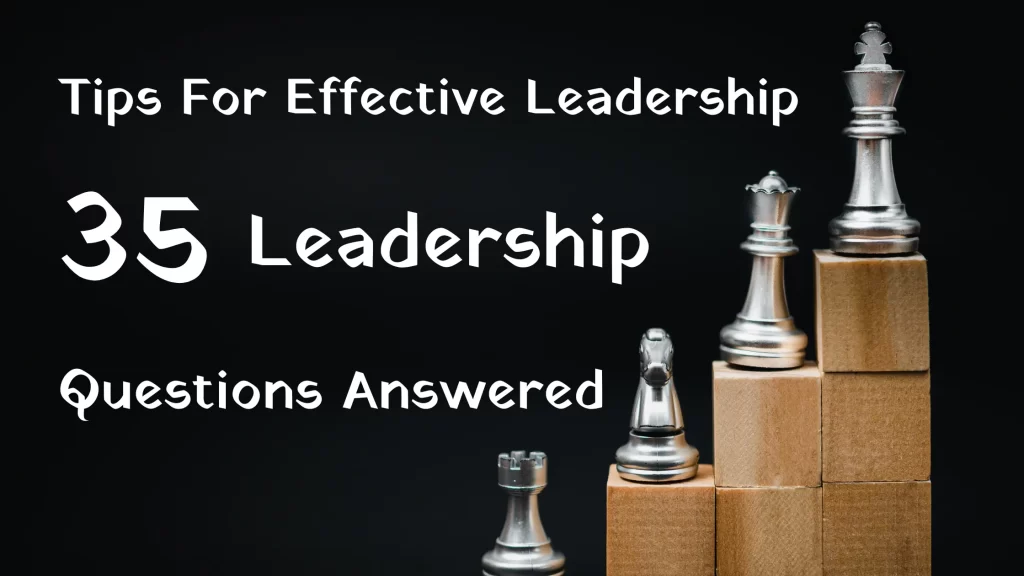Effective leadership is crucial for organizational success, but it often comes with its own set of challenges and decisions. If you’re looking to improve your leadership skills or simply want to understand what makes a great leader, you’ve come to the right place.
Why Leadership Matters: Key Skills Every Leader Needs
Leadership is more than just giving orders—it’s about guiding a team toward shared goals, fostering collaboration, and creating an environment where individuals can thrive. Whether you’re leading a small team or an entire organization, your ability to lead effectively can significantly impact your team’s productivity, morale, and overall success. In this post, we’ll explore common leadership challenges and answer the most frequently asked leadership questions to help you improve your leadership skills and grow as a leader.
1. What Makes a Good Leader?
A good leader is more than just a decision-maker. They are communicative, empathetic, visionary, and able to inspire others. Strong leadership also involves integrity, transparency, and consistency in both actions and words.
2. How Can a Leader Motivate Their Team?
Motivating a team requires recognizing individual strengths, setting clear goals, and empowering team members with responsibilities. Leaders can also encourage motivation by aligning work with personal interests, offering feedback, and celebrating achievements.
3. What is the Role of a Leader in Decision-Making?
Leaders make critical decisions with the best available information. They need to balance intuition with data, weigh risks, and involve their team in the decision-making process when appropriate. Good leaders are transparent and take responsibility for their decisions.
4. How Do Leaders Handle Failure?
Failure is inevitable, but effective leaders treat it as a learning opportunity. They reflect, adapt, and openly communicate lessons learned to their team. Embracing failure with a growth mindset encourages resilience in both the leader and the team.
5. How Do Leaders Build Trust with Their Teams?
Trust is built through consistency, transparency, and accountability. A leader who is reliable and honest in their actions fosters a strong bond with their team. Effective communication and showing empathy are key in creating a trusting relationship.
6. How Important is Emotional Intelligence in Leadership?
Emotional intelligence (EI) is one of the most crucial qualities of effective leadership. Leaders with high EI can better manage their own emotions, understand others’ feelings, and foster a positive, productive work environment. EI helps in conflict resolution, decision-making, and team motivation.
7. What Leadership Styles Exist, and How Do You Choose the Right One?
Common leadership styles include autocratic, democratic, transformational, transactional, and laissez-faire. The best leadership style depends on the situation, team dynamics, and the goals of the organization. A great leader can adapt their approach as needed.
8. How Do Leaders Manage Conflict Within a Team?
Leaders manage conflict by listening to all parties involved, addressing issues promptly, and fostering open communication. They aim for resolutions that are fair and constructive, encouraging collaboration instead of division.
9. What Role Does Communication Play in Leadership?
Effective communication is at the core of great leadership. Leaders must clearly communicate the vision, goals, and expectations to the team. They also need to listen actively, providing feedback and fostering an environment where team members feel heard.
10. How Do Leaders Inspire Innovation?
Leaders inspire innovation by creating a culture of creativity and risk-taking. They empower their team to think outside the box, provide resources, and support experimentation. Recognizing and rewarding innovative ideas encourages an environment ripe for innovation.
11. How Can a Leader Develop Their Leadership Skills?
Leaders can continuously improve their skills through mentorship, leadership training, self-reflection, and seeking feedback. Staying up-to-date on industry trends and reading leadership books also contributes to ongoing development.
12. What Are the Qualities of an Effective Team Leader?
An effective team leader is decisive, empathetic, and communicative. They motivate the team, delegate responsibilities efficiently, and lead by example. Team leaders foster collaboration, create a positive environment, and support individual growth.
13. How Do Leaders Manage Their Time Effectively?
Effective leaders prioritize tasks, set clear goals, and delegate appropriately. Time management tools, such as the Eisenhower Matrix or time-blocking, help leaders stay organized, ensuring focus on the most impactful activities.
14. What Role Does Vision Play in Leadership?
A compelling vision provides direction and purpose, aligning the team toward a common goal. Leaders with a clear vision inspire and guide their team, ensuring everyone understands their role in achieving the overall mission.
15. How Do Leaders Build a Positive Team Culture?
Leaders build a positive culture by promoting collaboration, respect, and inclusivity. They lead by example, foster open communication, celebrate successes, and encourage a work-life balance that supports personal well-being.
16. How Do You Handle Difficult Conversations as a Leader?
Difficult conversations are inevitable in leadership. A great leader approaches them with empathy, maintaining a calm and respectful tone. They focus on resolving the issue and providing actionable feedback rather than placing blame.
17. What is the Leader’s Role in Goal Setting?
Leaders set clear, measurable goals that align with the broader organizational mission. By involving the team in goal setting, leaders ensure buy-in and foster a sense of ownership, helping individuals understand how their work contributes to larger objectives.
18. How Do Leaders Encourage Accountability?
Leaders promote accountability by setting clear expectations, offering support, and holding team members responsible for their actions. A culture of ownership ensures that individuals take responsibility for both successes and challenges.
19. How Do Leaders Manage Change?
Change can be difficult, but effective leaders manage it by clearly explaining the reasons behind the change and involving the team in the process. By offering support and addressing concerns, they help team members adjust and thrive in new environments.
20. How Can Leaders Demonstrate Resilience?
Leaders demonstrate resilience by staying calm under pressure, maintaining focus on long-term goals, and showing perseverance in the face of setbacks. They support their team through challenges and model a positive attitude during difficult times.
21. How Do Leaders Make Decisions Under Pressure?
Leaders make decisions under pressure by staying calm, gathering as much information as possible, and trusting their intuition. They balance urgency with careful analysis, keeping the team informed while ensuring timely action.
22. What is Transformational Leadership?
Transformational leadership focuses on inspiring and motivating team members to exceed expectations. Transformational leaders foster creativity, create a compelling vision, and support their team’s personal and professional development.
23. How Do Leaders Delegate Effectively?
Effective delegation requires clear communication, trust, and understanding each team member’s strengths. Leaders assign tasks appropriately, provide necessary resources, and allow team members to take ownership while offering support when needed.
24. What is the Importance of Integrity in Leadership?
Integrity is vital because it establishes trust and credibility. Leaders who act ethically and transparently set the tone for the entire organization, fostering a positive culture based on honesty and respect.
25. How Do Leaders Handle Criticism?
Leaders handle criticism by maintaining an open mind and viewing it as an opportunity for growth. They listen to feedback, reflect on it, and take actionable steps to improve, encouraging a culture of feedback within the team.
26. How Can Leaders Support Diversity and Inclusion?
Leaders promote diversity and inclusion by fostering an environment where all team members feel respected and valued. They encourage diverse perspectives, implement inclusive hiring practices, and create policies that support equality.
27. What is Servant Leadership?
Servant leadership focuses on the well-being of the team. Leaders prioritize the growth and development of their team members, fostering a collaborative, supportive environment where the leader serves the needs of others.
28. How Do Leaders Stay Motivated?
Leaders stay motivated by aligning their personal goals with organizational objectives. They find inspiration in seeing their team succeed and embrace challenges as opportunities for growth, continually setting new goals to achieve.
29. How Do Leaders Create a Vision for the Future?
Creating a vision for the future involves understanding current trends, seeking input from the team, and aligning it with the organization’s long-term goals. A clear vision motivates the team and serves as a roadmap for success.
30. How Do You Lead When You Don’t Have All the Answers?
Great leaders are comfortable admitting when they don’t have all the answers. They seek input from others, collaborate, and use the collective intelligence of their team to find solutions while staying transparent.
31. What is the Importance of Feedback in Leadership?
Feedback is crucial for growth and improvement. Leaders should give regular, constructive feedback and seek input from their team. This two-way communication helps create a culture of continuous improvement.
32. How Can Leaders Improve Their Decision-Making?
Leaders improve their decision-making by seeking diverse perspectives, considering past experiences, and weighing the pros and cons. Using data to inform decisions and learning from past mistakes helps leaders refine their decision-making abilities.
33. How Do Leaders Maintain Work-Life Balance?
Leaders can maintain balance by setting boundaries, prioritizing personal well-being, and delegating tasks. Encouraging work-life balance within the team helps create a healthier, more productive work environment.
34. What is the Role of a Leader in Crisis Management?
In times of crisis, leaders provide direction, stay calm, and communicate clearly with their team. They make swift, informed decisions while keeping the team focused and motivated, ensuring the crisis is managed effectively.
35. How Do Leaders Create Long-Term Success?
Long-term success is built on clear strategy, continuous adaptation, and fostering a culture of innovation and resilience. Great leaders invest in their team’s development and continuously align the organization’s goals with evolving market needs.
Conclusion
Leadership is a multifaceted skill that requires constant growth and adaptability. By reflecting on these 35 leadership questions and answers, you can gain valuable insights into how to become a more effective leader. Remember, leadership isn’t just about managing people—it’s about inspiring them to reach their full potential.



